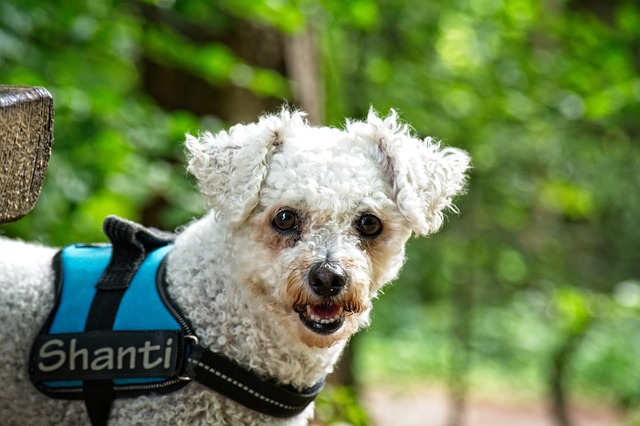The Bichon Frise is NOT a hypoallergenic dog, but it is one of the more allergy-friendly dog breeds due to its minimal shedding.
Many people mistake the Bichon as a no-shedding breed; however, as this pup still sheds, it can cause problems for those with severe allergies.
So just how hypoallergenic is the Bichon Frise?
I will be answering this question as well as touching on a few more things that you should know, including:
- What kind of coat does the Bichon Frise have?
- What makes a dog hypoallergenic?
- What can you do to limit allergy symptoms if your heart is set on a Bichon Frise?
The Bichon Frise Coat
A playful and intelligent dog, the Bichon has a double-layered short-curled coat that sheds very lightly year-round.
The Bichon also sheds more during the Spring and Fall as the seasonal temperatures shift.
The Bichon’s soft undercoat is silky to the touch and provides insulation. The Bichon’s outercoat, however, is medium-length and has corkscrew-like curls.
Despite looking slightly rough, groomers often compare touching this topcoat to touching cotton.
Unlike many double-coated breeds, the Bichon is not a heavy shedder – even when the seasonal changes cause dogs to “blow their coat” in preparation for temperature changes.
Major coat sheds prepare dogs for temperature changes, but the number of daylight hours in the day triggers this significant coat change.
The best way to maintain your Bichon’s coat is by brushing with a bristle brush daily. Brushing will help to remove any hair that falls out and sticks in the undercoat.
Brushing also helps to stimulate the oil glands in the skin that, produce a protective and nourishing oil that keeps the skin and coat protected and healthy.
Since the Bichon has a double coat, it is crucial to avoid using grooming tools that strip the undercoat (or that can cause long-term damage to fur growth.)
What are Hypoallergenic Dogs
To understand what makes a dog “hypoallergenic,” we must first discuss how allergies to dogs work.
Dogs produce protein in their urine, skin cells, and saliva. Some dog breeds will shed more of these proteins than other breeds.
When someone allergic to dogs encounters these proteins, their immune system identifies them as harmful “invaders” to the body.
That person’s immune system then launches an immune response and attempts to fight against the “foreign invaders.”
Allergy symptoms often involve a running nose and watering eyes as the body dispels the “invader” proteins.
So, when someone calls a dog “hypoallergenic,” they mean that a dog is less likely to cause an allergic reaction in someone allergic to dogs.
This often reduces allergic reactions because a dog sheds less; consequently, less dander is in the air!
It is also important to note that some dog breeds produce various levels of allergy-inducing proteins – if you have allergies, you may have noticed that some species cause you more symptoms than others – this is why.
Are Bichon Frise Hypoallergenic?
No. While the Bichon sheds less fur and, therefore, less dander than other dog breeds, this is technically not a hypoallergenic breed.
Limiting Allergy Symptoms When You Own a Bichon Frise
Do you have your heart set on bringing home a Bichon Frise but suffer from allergies? You can do some things to reduce the severity of your allergic reaction.
Regular Grooming
Daily brushing keeps loose hair and skin cells from falling out around the house and filling the house full of allergens!
Grooming is another necessity for this small fluffy pup as the fur can trap allergens, mold, and bacteria if it is not adequately cared for.
Healthy Diet
A healthy diet supports your dog’s fur coat and skin, and both impact how much fur and dander drift throughout the house, and the more anger, the worse your allergy symptoms will be!
A healthy diet incorporates a canine-friendly diet that caters to your dog’s lifestyle (not necessarily age!) This diet should also not include calorie-laden treats and people’s food!
Veterinary Care
Regular veterinary care is just as crucial to your Bichon Frise as diet and grooming.
Regular vet care keeps your dog updated on monthly preventatives that keep their fur coat and skin healthy and prevent them from developing long-term illnesses carried by parasites.
Conclusion / Summary
The Bichon Frise is not strictly a hypoallergenic breed, but it does not shed as much fur as various other breeds.
So, if you suffer from minimal allergies, the chances are good that you will do well with a Bichon in your home.
If you have a life-threatening allergy, I do not recommend adding this powder puff to your family!
Our choice of Bristle Brush from Amazon (Click on Image)


